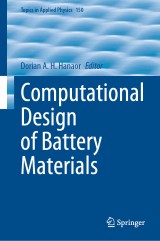Details
Computational Design of Battery Materials
Topics in Applied Physics, Band 150
|
192,59 € |
|
| Verlag: | Springer |
| Format: | |
| Veröffentl.: | 04.07.2024 |
| ISBN/EAN: | 9783031473036 |
| Sprache: | englisch |
Dieses eBook enthält ein Wasserzeichen.
Beschreibungen
<p>This book presents an essential survey of the state of the art in the application of diverse computational methods to the interpretation, prediction, and design of high-performance battery materials. Rechargeable batteries have become one of the most important technologies supporting the global transition from fossil fuels to renewable energy sources. Aided by the growth of high-performance computing and machine learning technologies, computational methods are being applied to design the battery materials of the future and pave the way to a more sustainable energy economy.</p><p> </p><p>In this contributed collection, leading battery material researchers from across the globe share their methods, insights, and expert knowledge in the application of computational methods for battery material design and interpretation. With chapters featuring an array of computational techniques applied to model the relevant properties of cathodes, anodes, and electrolytes, this book provides the ideal starting point for any researcher looking to integrate computational tools in the development of next-generation battery materials and processes.</p><p></p>
Battery materials: Bringing it all together for tomorrow’s energy storage needs.- Atomistic Simulations of Battery Materials and Processes.- Ab Initio Interfacial Electrochemistry Applied to Understanding, Tuning and Designing Battery Chemistry.- Electrolyte-Electrode Interfaces: A Review of Computer Simulations.- Many-particle Na-ion dynamics in NaMPO4 olivine phosphates (M=Mn, Fe).- Crystal Structure Prediction for Battery Materials.- Nanoscale Modelling of Substitutional Disorder in Battery Materials.- Machine learning methods for the design of battery manufacturing processes.- Machine learning methods for the design of battery manufacturing processes.- Applications of Ab Initio Molecular Dynamics for Modeling Batteries.- Forming a Chemically-Guided Basis for Cathode Materials with Reduced Biological Impact using Combined Density Functional Theory and Thermodynamics Modeling.- Oxygen Redox in Battery Cathodes: A Brief Overview.- Theoretical Investigation of Layered Anode Materials.- Design of Improved Cathode Materials by Intermixing Transition Metals in Sodium-Iron Sulphate and Sodium Manganate for Sodium-Ion Batteries.- Sodium Intercalation into Graphite and Graphene Complexes towards Advanced Sodium-Ion Battery Anode Materials.- Combining molecular simulations with modern experiments to design ionic liquid-based battery electrolytes.- Design of battery materials via defects and doping.- Role of Adsorption Energy in the Design of Battery Materials: A DFT Perspective.
<p> </p><p>Dorian Amir Henry Hanaor is a British, Israeli, Australian and German scientist, engineer and educator who has accumulated over 16 years of multi-faceted expertise in the field of materials engineering across roles in the private sector, education, R&D and consulting. Dorian’s unique approach to education and research involves leveraging effective cross-disciplinary integration to create new insights and knowledge in diverse engineering topics, with his work having been cited over 7,000 times in the academic literature. In recent years Dorian has led experimental and computational studies into the design optimization of innovative battery materials for lithium and post-lithium-ion batteries and has served as a consultant for sustainable materials sourcing projects. </p>
<p>This book presents an essential survey of the state of the art in the application of diverse computational methods to the interpretation, prediction, and design of high-performance battery materials. Rechargeable batteries have become one of the most important technologies supporting the global transition from fossil fuels to renewable energy sources. Aided by the growth of high-performance computing and machine learning technologies, computational methods are being applied to design the battery materials of the future and pave the way to a more sustainable energy economy.</p><p> </p><p>In this contributed collection, leading battery material researchers from across the globe share their methods, insights, and expert knowledge in the application of computational methods for battery material design and interpretation. With chapters featuring an array of computational techniques applied to model the relevant properties of cathodes, anodes, and electrolytes, this book provides the ideal starting point for any researcher looking to integrate computational tools in the development of next-generation battery materials and processes.</p><p></p>
Focuses on the state-of-the-art in computational techniques for the design of next-generation battery materials Covers materials for futuristic battery concepts such as Mg- and Na-based batteries Presents a timely survey of this rapidly growing and societally important field
Diese Produkte könnten Sie auch interessieren:

Neutron Applications in Earth, Energy and Environmental Sciences
von: Liyuan Liang, Romano Rinaldi, Helmut Schober
Preis: 149,79 €

Nanobioelectronics - for Electronics, Biology, and Medicine
von: Andreas Offenhäusser, Ross Rinaldi
Preis: 96,29 €
-
-
© 2024 media control GmbH
Alle Preise enthalten die gesetzliche Mehrwertsteuer. - AGB
- Impressum
- Datenschutzerklärung
- Kontakt
- FAQ
- Mein Konto
- Home
- Erweiterte Suche
- Widerrufsrecht
- Reader-Software
- Desktop-Ansicht
- Gutschein-Code einlösen

